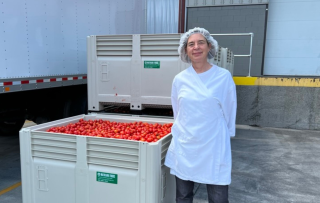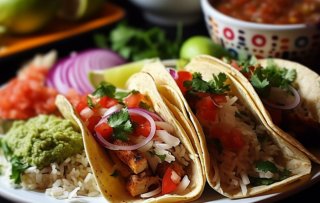What you eat matters. Personalized food is an emerging food category that empowers consumers to make healthier food choices, based on their lifestyle, personal health status and preferences. These personal food choices affect our entire food system: they affect not only the health of the individual, but also that of the planet. The category offers plenty of opportunities, but has so far not been able to reach the masses. Experts are hopeful that this will change in the coming years. Time for an update.
Though still early in development, personalized nutrition is quickly gaining traction in the western world. During the COVID-19 pandemic, general public awareness has risen regarding the importance of good health in preventing illness. In addition, individuals have grown more accustomed to customized products and services and having access to their personal health data – in real time – beyond their physician's office. It all collectively paves the way for personalized nutrition to reach full maturity.
A definition
Personalized nutrition can be a service or a product that utilizes individual-specific information and is founded on evidence based science. The ultimate goal is to give consumers control while promoting a positive, sustainable dietary behavioral change. This can result in measurable health improvement, health maintenance and disease specific benefits.
In a recent position paper aimed to achieve international consensus on the novel subject of personalized nutrition, the authors state that ‘industry investment and collaboration is essential to take personalized nutrition to the next level. Promoting joint innovation and fostering partnerships is crucial to debottleneck value chain challenges and drive growth in personalized nutrition. Industry players from all points in the value chain – from tech companies, diagnostic companies, food producers and retailers to other organizations or professions like health insurance, health care and dieticians – should be involved to foster a connected ecosystem.'
The contributing experts agree that ‘a flourishing personalized nutrition ecosystem is needed to empower consumers to change their behavior towards more healthy and more sustainable dietary practices. A linked system will bring together products and services that are attractive, simple to use, affordable, convenient, and easily accessible, so that the consumer can make fully informed choices. Only by having solid connections and collaborations, will we be able to truly change consumer behavior on a meaningful scale.'
From geeky gadgets to behavioral change
Nutritional scientist Nard Clabbers, currently Chief Scientist Officer at Foodned.com and lead author of the aforementioned position paper, is one of the leading experts in the field of personalized nutrition. In a recent interview, he explained, “I consider personalized nutrition as a form of empowerment. It helps consumers improve their diet by making informed choices. Personalized nutrition may involve tailored dietary advice, or specifically designed foods, such as a 3D-printed meal or a supplement tailored to an individual’s mineral balance. Or, the results may be used to compose a detailed shopping list, thereby helping the client navigate the huge supermarket offering to make the right – healthier – choices.”
One intriguing insight gained from a study into personalized nutrition conducted by TNO and Wageningen Research demonstrated that psychosocial factors are crucially important in providing personalized nutritional advice. Clabbers states, “We have learned to approach personalisation at multiple levels - biochemical as well as psychosocial. People have different preferences regarding how they want to be informed, how they ‘learn’ most effectively and what motivates them. But until now, only little differentiation is being applied.”
Market size
The personalized nutrition industry topped $8.1 billion in 2020 and is expected to more than double to $19.7 billion by 2027. Some analysts project the personalized nutrition industry will reach more than $64 billion by 2040. To date, the industry is made up of approximately 500 companies, most of which are US-based start-ups, with Europe a close second and Asia a rapidly emerging third. (source: NX-Food)
According to NX-Food – a food innovation platform for start-ups, corporates and investors – there are four major trends that drive the personalized nutrition industry:
-
Scientific developments, including the understanding that a diet is not a ‘one size fits all’-solution. In addition, an improved knowledge of the gut microbiome, and the added insight that genetics only explains a small portion of an individual’s response to foods.
-
Technological advances with data collection e.g. wearables or blood testing kits for at home resulting in additional data that can be analyzed.
-
Socio-economic shifts, meaning that consumers increasingly focus on health and wellness improvement and are empowered by better access to knowledge.
-
Growth of personalized experiences in general, which add value for consumers but also raise the expectation to be treated individually.
An evolving market
Examining how the market for personalized nutrition has evolved over the past 15 years, there have been roughly three phases in this nascent market (Foodvalley, 2021). It began with a laser focus on DNA analysis, which has now been proven to be only a piece of the puzzle. This evolved into a second phase that included a systems approach and more holistic advice, enabled by new technologies and the use of Artificial Intelligence. Today, the market is moving into a third phase, with recommendations now being supported by behavior change techniques to ensure people develop lasting healthier eating habits.
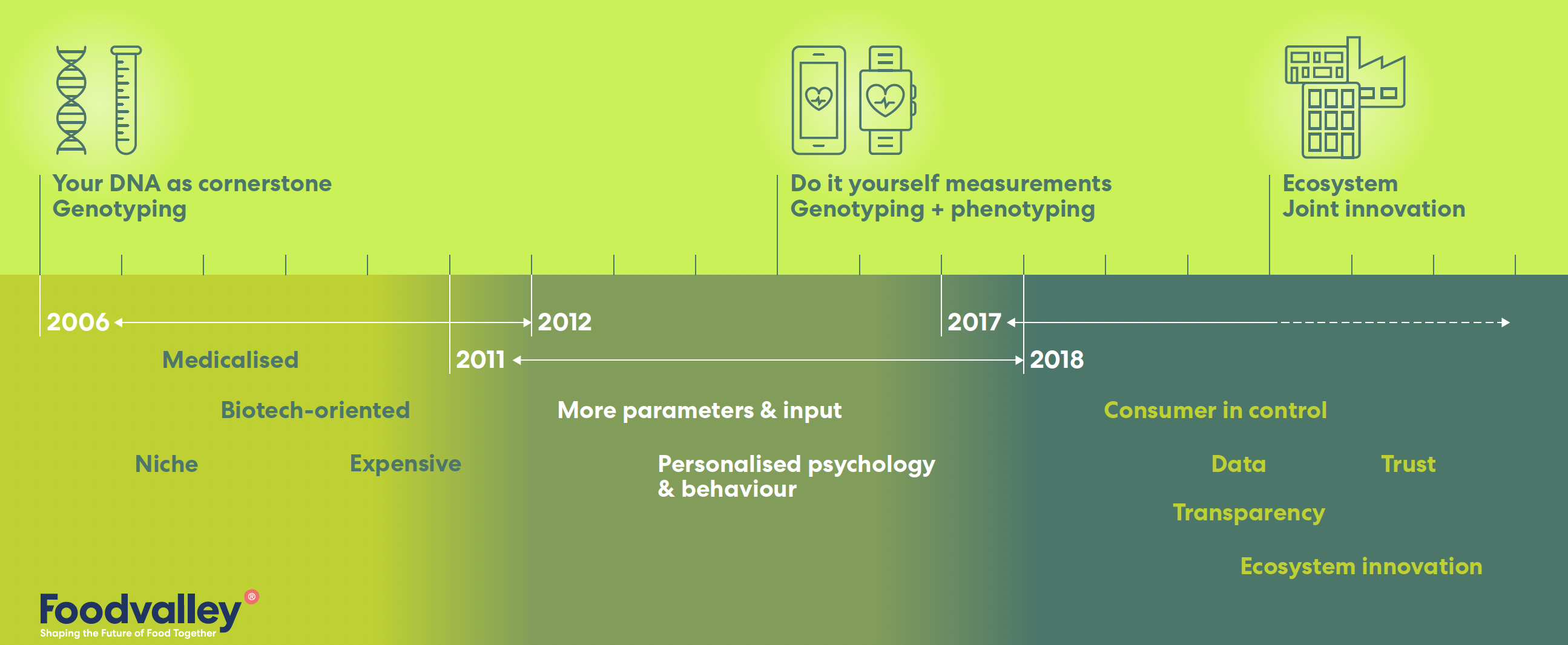
Instead of simply requesting that consumers submit their health and lifestyle data to receive personalized advice and feedback, modern personalized nutrition approaches require interaction and reciprocity between parties. Continuous user feedback on the effectiveness and utility of the advice is utilized to improve the underlying algorithms that shape the tailor-made advice.
Step by step
While the market is developing towards full personalization, along the road, various levels of personalization can be distinguished. Products and services can be ranked on a scale ranging from ‘mass’ (no personalization) to ‘fully personalized’ (beneficial for you). In order to provide fully personalized nutrition, a lot of – preferably real-time – data is needed, based on detailed physical measurements. But, you can also distinguish ‘intermediate’ products and services that target specific groups (like endurance athletes, diabetics or pregnant people) or cater to specific dietary preferences. Meal subscription services, for instance, provide increasingly fine-grained options to choose from (low-carb, gluten free, vegan) as do targeted, fortified or functional foods.
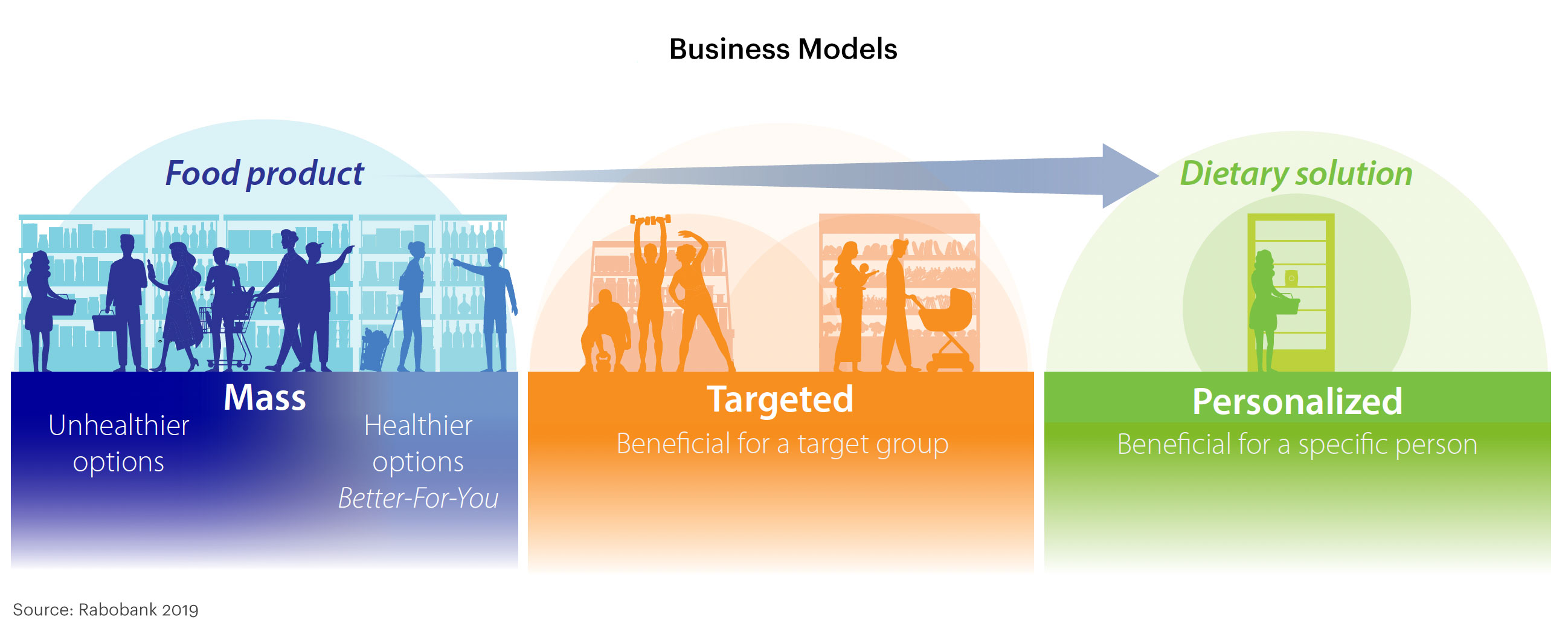
The four types of assessments
In assessing the current market offerings within personalized nutrition, most products appear to fall into four main categories. All of these categories could feature the integration of smart devices to a certain degree (eg. step count, heart rate variability, blood glucose monitoring).
Assessment-based: consumers provide varying levels of personal information from basic (e.g. height, weight, gender) to more complex such as medical history or diet restrictions and food allergies. Example companies are:
- Paquet (Singapore) offers customized vitamins, minerals and supplements (VMS)
- Gainful (US) offers personalized protein powder mixes
- Verdify (Netherlands) offers personalized recipes based on artificial intelligence
Genetic-based: consumers provide a saliva swab to assess genes that have been linked to health or fitness level. Example companies are:
- DNA Fit (UK) provides complete nutrition programs based around DNA
- Nutri-Genetix (UK) provides a health report and genetically personalized meal-shakes
Biomarker-based: biomarker-based services utilize blood tests to offer a more real-time assessment of nutrient needs. Example companies are:
- Loewi (Germany) offers a subscription-based dietary supplements service – Bioniq PRO
- Vitl (UK) provides tailor made vitamins and health advice, based on blood sample tests of vitamin and cholesterol levels. Baze (US) uses a comparable approach to provide personalized VMS packs
Microbiome-based: gut health-focused brands use a stool sample that assesses the amount and distribution of gut microorganism species. Example companies are:
- Brands such as Viome (US) and Biohm (US) lead in this category and offer personalized supplements and probiotics
Predictive insights
Zoe (UK) is taking personalisation even a step further and aims to use big data and machine learning to develop predictive insights on how people will respond to different foods. The goal is to improve the customers gut health and reduce inflammatory responses caused by their diet. The firm provides customers with a home testing kit that includes a blood sugar monitor and stool sample collector.
This type of service strongly depends on the high quality data input of its users. As this in depth analysis will only appeal to a small customer base, it provides a challenge, as the service will only become more accurate in its predictions when aggregating health data from as many users as possible.
Challenges ahead
It is clear that there are still some technological bottlenecks that must be addressed in order for the personalized nutrition category to become relevant to the mass market. Personalized nutrition is subject to extensive regulations that change over time and vary from country to country. Globally, the relevant topics are data protection, product qualification and claims.
-
Real time data quantification
The current market is for the most part limited to retrospective data analysis (eg. blood tests collected and processed). In order to reach an optimal level of personalisation, there needs to be a step forward in smart devices and health monitoring services that allow for constant data quantification. An early example of this is Clear, a continuous glucose monitor that gives consumers real time feedback on their blood glucose levels. -
Maximizing data security
Although consumers are open to sharing their personal data to obtain more personalized products, brands need to maximize the security of the data to enhance trust in this category. This means compliance with local and regional data protection legislation and communicating to consumers how their data is used for their benefit. -
Consumer centric approach
With increased internet connectivity, data speed and the mass adoption of smart devices, including smart kitchen equipment, digital home assistants and wearables, the future of the personalized nutrition category is highly interconnected. The challenge lies in striking a balance of providing consumers with maximum (health) benefits, with minimal invasiveness.
Promising business models
Finally, let's take a look into the future. Because what are the most promising growth segments in the market of personalized nutrition? In a whitepaper by NXFood, experts have described the four most promising business models for the personalized nutrition category:
-
Personalized eGrocery
In many ways, personalized nutrition has already been introduced. Customers can segment their search results based on their nutritional needs such as organic, gluten-free, diabetic-safe, etc. This model could provide opportunities to offer even more granular segments for customers based on metabolic types or biomarkers such as omega acids, vitamins, or cholesterol levels for instance. -
Fastcasual & fastservice
Fast casual and fast service restaurants offer a huge potential to bring personalized nutrition to a mass market. Many restaurants already offer individualized meals, like salads, poke bowls or juices. These eateries often focus on health-conscious consumers who might already be familiar with personalized nutrition. The business model could work for sit-down and delivery restaurants, both of which can apply digital technologies to leverage personal nutrition preferences in their menus and ordering processes. Customers control personalization, typically by filtering meal options based on pre-defined criteria. -
Personalized Nutrition Platform
Personalized nutrition can also be further developed as a feature of a network of businesses. This could work for instance by connecting a customer’s existing nutritional profile – extracted through DNA/blood/stool tests and/or survey results on taste preferences, eating and exercise habits and personal health goals – to their preferred delivery website, restaurant, or retail store in order to receive personalized recommendations. This model requires developing a sophisticated platform with both B2B and B2C components. -
Subscription-based personalized meal service
As personalized supplements sold as a subscription service have already gained traction among consumers, a subscription to a personalized meal service may also appeal to a select group of consumers. In fact, boxed meal subscriptions, frozen ready-to-eat meal subscription services and even personalized pet food subscriptions have grown significantly in popularity in recent years. A personalized meal subscription service would be a fast and direct method of introducing personalized nutrition to an audience that is already receptive to the subscription concept.
///
Sources
- Fastcompany, article, How tech is enabling a personalized path to health and well-being, 2021
- Foodvalley, report, Personalised Nutrition Position Paper, 2021 (pdf-dowload)
- Foodvalley, article, Personalised nutrition: an exciting category with challenges ahead, 2021
- Rabobank, report, Food, Personalized – Is the End of Mass-Produced Food Upon Us?, 2019
- Mintel, summary report, Future of Nutrition, Health and Wellness: 2021, 2021
- NX-Food, whitepaper, Personalised Nutrition Whitepaper: Finding the right Business Model to overcome the Valley of Death, 2021
- TasteTomorrow by Puratos, article, How do we empower consumers to make better choices about their personal health, 2019
- Nutrition Insight, article, Effective personalized nutrition advice is both biological and psychological, note industry experts, 2019
- Wageningen University and Research, article, Nutrition and health advice: Personalised approach more effective than one-size-fits-all approaches, 2021
.jpg-28x28.jpg) Written by
Written by 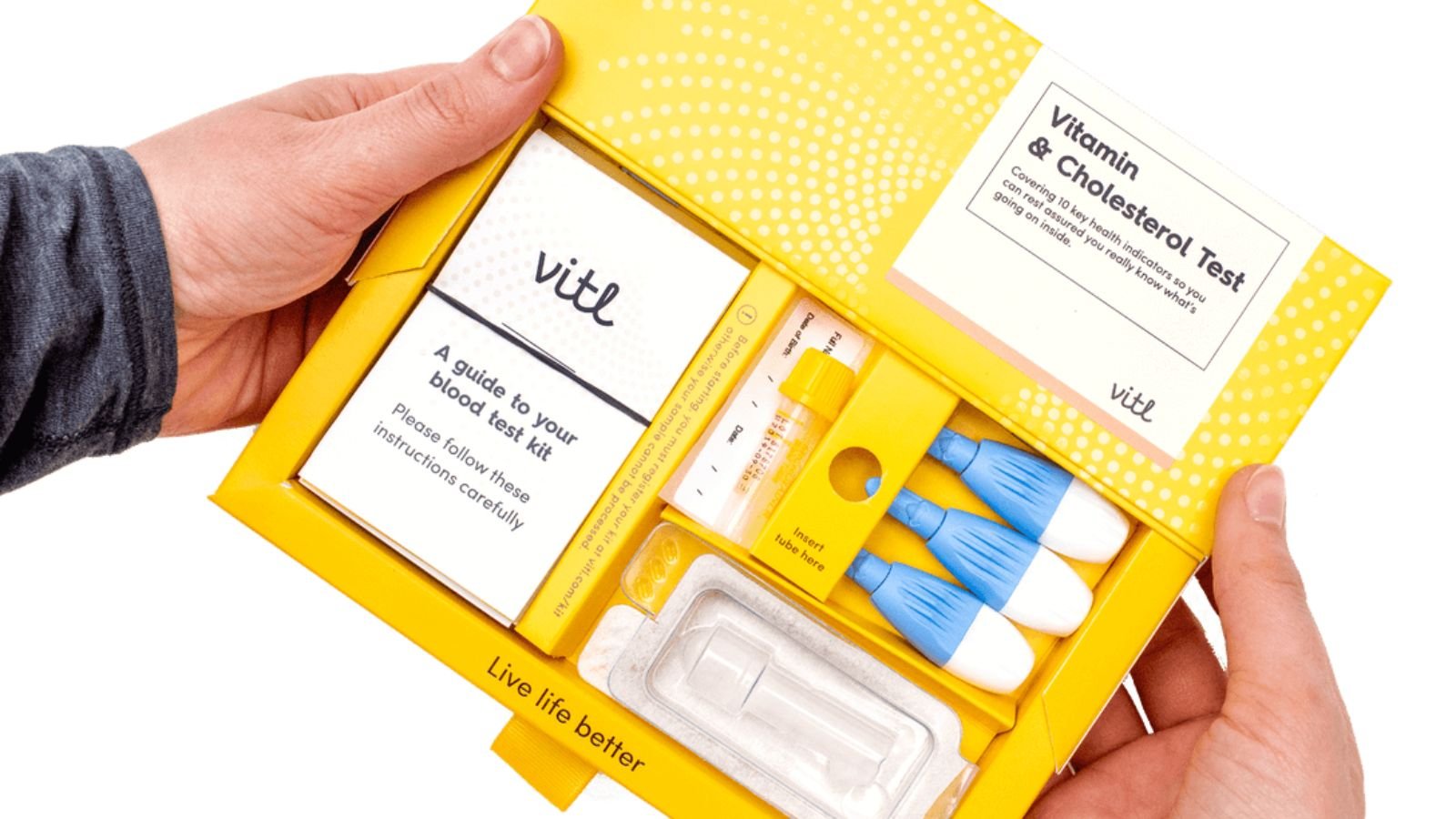
.jpg-300x300.jpg)
.jpg-50x50.jpg)






















